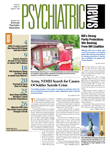If the DSM-V work group members are not supposed to be talking about their labors, something is wrong.
Because it would seem they've been doing a lot of talking.
DSM-V Task Force leaders say there have been 100 peer-reviewed publications directly related to the DSM-V development process, at least 10 published DSM-V planning-conference monographs, and more than 50 live or online presentations on DSM-V deliberations beginning in 2001 through this month—all of which are listed on APA's Web site at<www.psych.org/dsmv.asp>—with more anticipated through April 2010 (see end of article).
Yet a persistent criticism of the process, percolating in Internet blogs, has been that the deliberations have been “secretive.” Bloggers have hinted darkly at a process beholden to special interests and cited a“ confidentiality agreement” that all work group members were required to sign.
Allen Frances, M.D., and Robert Spitzer, M.D., have raised the confidentiality agreement in their criticisms—aired on the Web site of Psychiatric Times and in a July letter to APA's Board of Trustees—of the overall process by which the new manual is being developed. Frances was chair of the DSM-IV Task Force, and Spitzer was chair of the Task Force on Nomenclature and Statistics for DSM-III.
“Confidentiality agreements have definitely inhibited the necessary back-and-forth free flow of information and were totally unnecessary,” Frances told Psychiatric News. “But the much greater secrecy issue now is the failure to post the specific wordings of the DSM-V options well before field testing. Without prior review done by the entire field and well beyond the very narrow circle of existing advisors, DSM-V will almost certainly be riddled with many unrecognized problems that will haunt us and our patients.”
Spitzer, in an interview with this newspaper, said he has tried without success to learn the purpose of the confidentiality agreement. But he also acknowledged that when asked about the agreement, work group members with whom he spoke did not seem particularly aware of its content.
That would seem to defuse the idea that the agreement was designed as a“ gag” on members, and task force members who spoke with Psychiatric News said it was never intended—and has not acted—as such.
“The task force and work group members are not prevented, and in fact are encouraged, to speak publicly about the DSM-V process and the conceptual issues they are addressing in their individual work groups,” said Darrel Regier, M.D., M.P.H., executive director of the American Psychiatric Institute for Research and Education (APIRE), director of APA's Office of Research, and vice chair of the DSM-V Task Force. “As the groups prepare criteria for field testing, they will be publishing the extensive literature reviews from clinical and epidemiological studies that are helping to inform decisions.”
He noted that the first of these, from the DSM-V Eating Disorders Work Group, is already available online, while other groups have reviews currently in production and/or in press.
Regier added that the purpose of the confidentiality agreements is to protect APA's intellectual property rights and to prevent task force leaders from developing the kind of individual royalty agreements for publishing products related to the manual that were typical of earlier DSM editions.
“This publishing approach is a clear break from the previous precedent where millions of dollars generated from DSM products were received by task force leaders as the result of generous royalty arrangements. Such funds could be used at the discretion of the authors for personal use or be directed to their university-associated foundation accounts.”
Regier continued, “Current plans call for funding an infrastructure at APA/APIRE for making DSM-V a 'living document' that will be periodically revised in response to research advances much like the APA practice guidelines or the AMA CPT codes.”
Spitzer acknowledged that proceeds from royalty arrangements for related DSM products he authored—including the DSM-IV-TR Casebook and the Structured Clinical Interview for DSM-IV—have been “substantial,” though he noted that those proceeds have gone into research at Columbia University, where Spitzer is a professor of psychiatry.
Both Spitzer and Frances have insisted, however, that their criticisms of the new process are valid on their merits. “I had hoped my intervention would lead to a reasoned discussion of the issues—all of which they have evaded,” Frances told Psychiatric News. “The questions raised in the commentary remain crucial and will not go away.”
Regier noted that APA's Board of Trustees might have put greater emphasis on the consultative role that work group members were expected to have with their colleagues in developing the manual while maintaining transparency of any bias associated with such consultation.
“At the time, they were more concerned about changing the DSM developmental paradigm by focusing on the conflict-of-interest policy, reducing the level of control that any one university had on the DSM development, and establishing a different publishing and intellectual property strategy for DSM-V–related products,” Regier said.
“All of these concerns, plus the deficits of the current DSM-IV identified by clinicians and researchers over the past 15 years, have made the entire revision process very different from that experienced by those involved with the previous revisions. The conceptual approach and the revision timetable are well laid out in the recent June 2009 American Journal of Psychiatry article—and all of the proposals for change will be given ample opportunity for comment and field testing.”
He added, “The sheer volume of publications, presentations, and discussions makes it difficult to argue that the confidentiality agreements are perpetuating secrecy.”
Draft criteria from the DSM-V Eating Disorders Work Group are posted at<www3.interscience.wiley.com/journal/111089244/issue>. A partial list of past and future presentations on DSM is posted at<www.psych.org/MainMenu/Research/DSMIV/DSMV/DSMRevisionActivities/DSMVPresentations_1.aspx>. A list of published DSM-V planning conference series monographs is posted at<www.psych.org/MainMenu/Research/DSMIV/DSMV/DSMRevisionActivities/DSM-V-Monographs.aspx>. A list of peer-reviewed publications related to the DSM-V development process is posted at<www.psych.org/MainMenu/Research/DSMIV/DSMV/DSMRevisionActivities/DSMV-Publications.aspx>.▪
